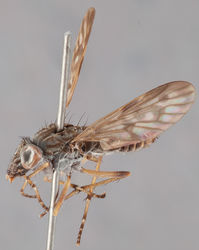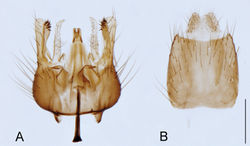Manestella ocellaris
| Notice: | This page is derived from the original publication listed below, whose author(s) should always be credited. Further contributors may edit and improve the content of this page and, consequently, need to be credited as well (see page history). Any assessment of factual correctness requires a careful review of the original article as well as of subsequent contributions.
If you are uncertain whether your planned contribution is correct or not, we suggest that you use the associated discussion page instead of editing the page directly. This page should be cited as follows (rationale):
Citation formats to copy and paste
BibTeX: @article{Winterton2012ZooKeys240, RIS/ Endnote: TY - JOUR Wikipedia/ Citizendium: <ref name="Winterton2012ZooKeys240">{{Citation See also the citation download page at the journal. |
Ordo: Diptera
Familia: Therevidae
Genus: Manestella
Name
Manestella ocellaris Winterton & Lambkin, 2012 sp. n. – Wikispecies link – ZooBank link – Pensoft Profile
Type material
Holotype male, AUSTRALIA: Queensland: Burrum Heads, 6.ix.1987, G. & A. Daniels [-27.18, 152.6] (AMS).
Paratypes. AUSTRALIA: Queensland: 6 males, 2 females, Burrum Heads, 6.ix.1987, G. & A. Daniels [-27.18, 152.6] (AMS, CAS).
Diagnosis
Wing mottled infuscate, fenestrations faint in male; male frontal setae similar length to scape setae; frons protruding in profile; single row of postocular macrosetae adjacent to ocellar tubercle in male; femora brown with yellow suffusion; male abdomen without silver velutum; gonocoxites without ventromedial projection, posterolateral area glossy, glabrous; female frontal markings as narrow medial stripe and two diffuse brown spots laterally along eye margin.
Description
Body length= 3.0–4.0 mm (male), 4.0–5.0 mm (female). Head. Frontal pubescence silver-grey with light brown markings, lower frontal markings as a narrow brown medial stripe and diffuse spot above antennal base, an additional spot laterally in female; lower frons protruding anteriorly; male frontal vestiture with patch of dark setae above antenna, equal length to setae on scape, female frontal vestiture with uniform small setae, longer immediately above antenna; male frons width at narrowest point less than width of anterior ocellus but not contiguous; male postocular setae as single row immediately laterad of ocellar tubercle, setae black; occiput pubescence grey, narrow brown stripe medially; genal setae pale; antennal scape equal length to flagellum, numerous large dark setae; flagellum dark yellow to brown. Thorax. Scutal markings grey with dark brown pattern, two brown pubescence medial stripes anteriorly, joining posteriorly, lateral stripes broken to tessellate, scattered dark setae, denser anteriorly; pleuron with silver-grey pubescence, anepisternum with diffuse brown marking dorsally; katatergite setae uniformly pale; coxae dark, overlain with silver-grey pubescence, setae mostly pale; femora brown with yellowish suffusion (variable intensity), short dark setae admixed with longer pale setae; tibiae yellow, dark grey-brown apically; tarsi dark yellow with apices brown; wing mottled infuscate, fenestrations faint; scutal chaetotaxy (pairs): np, 3; sa, 1; pa, 1; dc, 4–5; sc, 1. Abdomen. Abdomen dark brown, grey pubescent laterally; male abdominal vestiture mostly elongate pale setae, denser and more elongate laterally; female intersegmental membrane distinctly pale; terminalia brown. Male genitalia. Gonocoxite without triangular medial process, gonocoxite process relatively elongate and spatulate; inner gonocoxal process with strong dark setae apically, gonocoxite velutum extensive, distinct, shiny glabrous area posterolaterally.
Comments
Manestella ocellaris sp. n. is an eastern species close to Manestella cooloola sp. n. and Manestella tristriata based on the mottled wing and protruding male frons with large macrosetae. This species can be distinguished by the lack of velutum on the male abdomen and by the glossy, glabrous patch posteriorly on the gonocoxite.
Etymology
The specific epithet is derived from the Latin ocellatus, eyelike spots; referring to the brown markings on the frons.
Original Description
- Winterton, S; Lambkin, C; 2012: New Australian stiletto flies: revision of Manestella Metz and description of Medomega gen. n. (Diptera, Therevidae, Agapophytinae) ZooKeys, 240: 1-119. doi
Images
|



